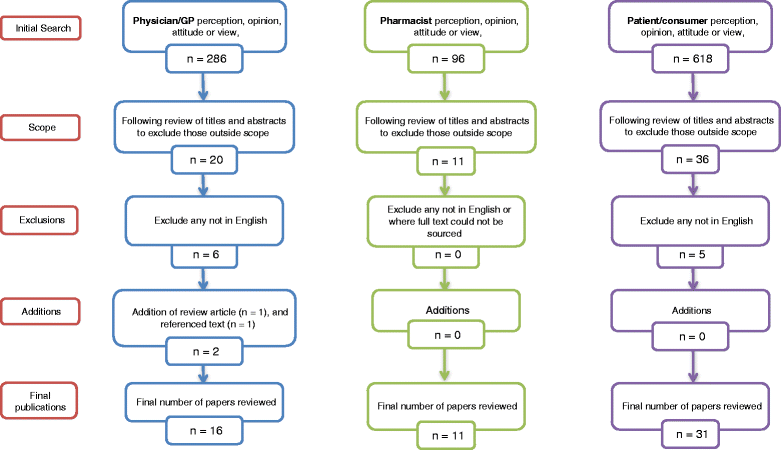What do people really think of generic medicines? A systematic review and critical appraisal of literature on stakeholder perceptions of generic drugs
- PMID: 26224091
- PMCID: PMC4520280
- DOI: 10.1186/s12916-015-0415-3
What do people really think of generic medicines? A systematic review and critical appraisal of literature on stakeholder perceptions of generic drugs
Abstract
Background: Considerable emphasis is presently being placed on usage of generic medicines by governments focussed on the potential economic benefits associated with their use. Concurrently, there is increasing discussion in the lay media of perceived doubts regarding the quality and equivalence of generic medicines. The objective of this paper is to report the outcomes of a systematic search for peer-reviewed, published studies that focus on physician, pharmacist and patient/consumer perspectives of generic medicines.
Methods: Literature published between January 2003 and November 2014, which is indexed in PubMed and Scopus, on the topic of opinions of physicians, pharmacists and patients with respect to generic medicines was searched, and articles within the scope of this review were appraised. Search keywords used included perception, opinion, attitude and view, along with keywords specific to each cohort.
Results: Following review of titles and abstracts to identify publications relevant to the scope, 16 papers on physician opinions, 11 papers on pharmacist opinions and 31 papers on patient/consumer opinions were included in this review. Quantitative studies (n = 37) were the most common approach adopted by researchers, generally in the form of self-administered questionnaires/surveys. Qualitative methodologies (n = 15) were also reported, albeit in fewer cases. In all three cohorts, opinions of generic medicines have improved but some mistrust remains, most particularly in the patient group where there appears to be a strongly held belief that less expensive equals lower quality. Acceptance of generics appears to be higher in consumers with higher levels of education while patients from lower socioeconomic demographic groups, hence generally having lower levels of education, tend to have greater mistrust of generics.
Conclusions: A key factor in improving confidence in generic products is the provision of information and education, particularly in the areas of equivalency, regulation and dispelling myths about generic medicines (such as the belief that they are counterfeits). Further, as patient trust in their physician often overrules their personal mistrust of generic medicines, enhancing the opinions of physicians regarding generics may have particular importance in strategies to promote usage and acceptance of generic medicines in the future.
Figures
References
-
- World Health Organization (WHO) Generic drugs. Geneva: WHO; 2015.
-
- US Food and Drug Administration (FDA) Generic drugs. Silver Spring, MD: FDA; 2008. pproval of generic drugs.
-
- European Medicines Agency (EMA) Questions and answers on generic medicines. Canary Wharf: EMA; 2011.
-
- Organisation for Economic Co-operation and Development (OECD). What future for health spending? OECD Economics Department Policy Notes. 2013;19:1–13. http://www.oecd.org/economy/health-spending.pdf. Accessed 21 June 2015.
-
- World Health Organization (WHO). WHO drug information. Volume 28, No 1. Geneva: WHO; 2014. http://www.who.int/medicines/publications/druginformation/issues/DrugInf.... Accessed 21 June 2015.
Publication types
MeSH terms
Substances
LinkOut - more resources
Full Text Sources
Other Literature Sources


